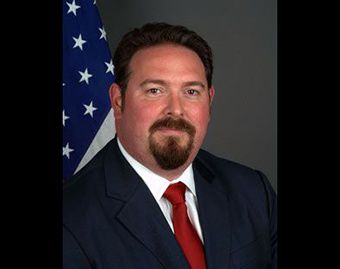Pope Francis is contributing to the fight against human trafficking by making the matter a frequent point of public discourse, says a U.S. ambassador who specializes in the subject. Luis CdeBaca, U.S. Ambassador in the Office to Monitor and Combat Trafficking in Persons, shared with CNA April 12 his impressions about the Pope Francis’ commitment against modern day slavery. “I do see Pope Francis working to insert the issue of human trafficking in informal comments. The idea is to institutionalize the issue as part of the normal public discourse,” the ambassador said. He underscored that when Pope Francis “talks about freedom and mentions modern slavery, the latter becomes the normal part of the conversation— it is very exciting.” He emphasized that “Popes in the past have issued writings and statements, but writings and statements don’t necessarily have the same impact as the spoken word and what people may hear. For instance, I was struck that at the Mass we had here in Washington for the St. Josephine Bakita feast, the priest talked in the sermon very extensively about what Pope Benedict XVI wrote on human trafficking. Just a few people knew it, and policy makers have not really heard it.” Pope Francis had fierce words against human trafficking during the first year of his pontificate. In a speech to a new group of ambassadors accredited to the Holy See Dec. 12, the pontiff said that human trafficking is “an issue that worries me very much and today is threatening people’s dignity.” On March 5, Pope Francis sent a message to the faithful in Brazil on the occasion of the annual Lenten “Fraternity Campaign,” exclaiming that “it is not possible to remain indifferent before the knowledge that human beings are bought and sold like goods!” Pope Francis also backed a workshop on “Trafficking in Human Beings: Modern Slavery” organized by the Pontifical Academy for Sciences and held last November. The conference organizers issued a joint statement based on the suggestions presented by the participants, which included proposals for media, religious institutions, civil organizations and business sectors to work together in order to combat human trafficking. Ambassador CdeBeca took part in that workshop. He told CNA that “the final document laying out the 42 points was very well thought-out, and represents the Vatican’s cutting edge work on human trafficking. It is evident that the Vatican is putting itself into the lead on human trafficking, making sure that it is not just religious, but also ‘secular.’” The ambassador stressed that “human trafficking is modern slavery and impacts people across the globe. It’s vital to focus on the victims as survivors and incorporate their voices into anti-trafficking policies and programs.” “Part of our goal is to encourage NGOs we work with to think outside-the-box,” he explained. “For example, many NGOs do a great job addressing the child sex trafficking or migration issue; however, we encourage these organizations to take a hard look at issues facing adults or people in their own countries, rather than only children or migrants. It’s important to look at the issue of human trafficking holistically.” A holistic approach to the issue was also experienced in a conference on human trafficking organized by the Bishops Conference of England and Wales April 9-10, hosted by the Pontifical Academy for the Sciences, in the Vatican City State. The conference gathered police chiefs from 20 different nations around the world, and both law enforcement and Vatican officials exchanged ideas on how to collaborate in combating the issue and caring for victims. In a message sent to the conference, Pope Francis encouraged the participants all to “combine our efforts” with the desire for “our strategies and areas of expertise to be accompanied and reinforced by the mercy of the Gospel” and “by closeness to the men and women who are victims of this crime.”

